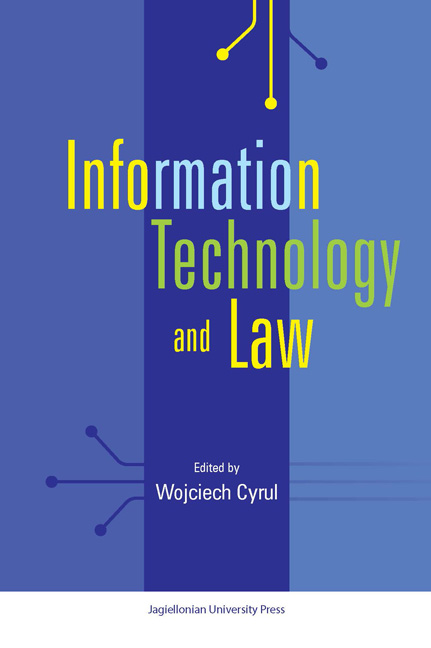Book contents
- Frontmatter
- CONTENTS
- Preface
- Chapter 1 Technological Destabilization of Law
- Chapter 2 Problems with the Storing and Presentation of Information
- Chapter 3 XML Models for Legal Documents: Current Polish Practices and International Standards
- Chapter 4 Similarity Analysis of Polish Legal Documents Using WordNets Semantic Relations
- Chapter 5 Consolidation of Legal Documents in an Electronic Format
- Chapter 6 A Three Dimensional – Code and a Question of the Normative Hyper-linking?
- Chapter 7 The Law, Labour Unions and Information Technology: Enhancing or Restricting Democracy at the Workplace
- Chapter 8 Protection of the Consumer in Digital Content Contracts
- Chapter 9 Procedure, Time and Imputation in Criminal Law
Chapter 1 - Technological Destabilization of Law
Published online by Cambridge University Press: 05 December 2014
- Frontmatter
- CONTENTS
- Preface
- Chapter 1 Technological Destabilization of Law
- Chapter 2 Problems with the Storing and Presentation of Information
- Chapter 3 XML Models for Legal Documents: Current Polish Practices and International Standards
- Chapter 4 Similarity Analysis of Polish Legal Documents Using WordNets Semantic Relations
- Chapter 5 Consolidation of Legal Documents in an Electronic Format
- Chapter 6 A Three Dimensional – Code and a Question of the Normative Hyper-linking?
- Chapter 7 The Law, Labour Unions and Information Technology: Enhancing or Restricting Democracy at the Workplace
- Chapter 8 Protection of the Consumer in Digital Content Contracts
- Chapter 9 Procedure, Time and Imputation in Criminal Law
Summary
1. Introduction
Nowadays, many publications are being written about the information culture which is the system of attitudes to the information and communication technologies. It constitutes an aspect of the development of an information society, conditioned to a degree by the intellectual liberation from the forces and resources of the nature. It is a kind of culture, based on a state of knowledge and the forms of social coexistence, using the information technologies. Its specific area is a culture of the Internet. According to Castells, this culture of the Internet is composed of four freedom cultures: the techno-meritocratic (technical), the hacker (creative), the communitarian (communal) and the managerial (entrepreneurial) cultures.
The nature of the Internet is shaped not only by Internet surfers such as Internet technocrats, hackers, communitarians and managers, but also by the legislator. We can speak about its genetic and internal self-regulation and about the subsequent and external state regulation. The increasing importance of the Internet is at the same time the cause and the effect of the growing litigiousness of the relations established by it, and the positivisation of the rules worked out within it. We can observe a growing diversification of endogenic and exogenic regulations regarding the Internet, in the direction extending its autonomy, but also its dependence on the State. It is connected with the interpenetration of many spheres – natural and artificial, real and virtual, humanistic and technical.
- Type
- Chapter
- Information
- Information Technology and Law , pp. 11 - 26Publisher: Jagiellonian University PressPrint publication year: 2014



